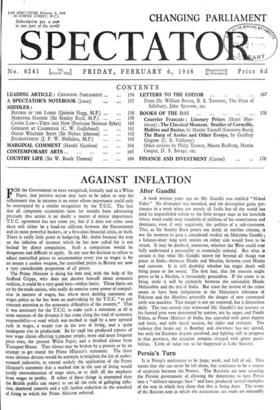AGAINST INFLATION
FOR the Government to nave recognised, formally and in a White Paper, that positive action may have to be taken to stop the inflationary rise in incomes is an event whose importance could only be overtopped by a similar recognition by the T.U.C. The fact that all competent economists have for months been advocating precisely this action is no doubt a matter of minor importance. T.U.C. agreement has not come yet, but if it does not come soon there will either be a head-on collision between the Government and its most powerful backers, or a first-class financial crisis, or both. There is really little point in badgering Mr. Attlee because the stop on the inflation of incomes which he has now called for is not backed by direct compulsion. Such a compulsion would be dangerous and difficult to apply. In any case the decision to refuse to adjust controlled prices to accommodate every rise in wages is by no means a useless weapon, for controlled prices in Britain are now a very considerable proportion of all prices.
The Prime Minister is doing his best and, with the help of Sir Stafford Cripps, who does not deceive himself about economic realities, it could be a very good best—within limits. Those limits arc set by the trade unions, who really do exercise some power of compul- sion in matters of wages, but whose most dashing statement on wages policy so far has been an undertaking by the T.U.C. " to pay constant attention to the economic difficulties of the country." That it was necessary for the T.U.C. to make such a statement at all is some measure of the distance it has come along the road of economic responsibility—a road which was marked in 1948 by a new upward rush in wages, a steady rise in the cost of living, and a quite inadequate rise in production. So far 1948 has produced reports of new wage claims affecting 1,500,000 people, more and more frequent price rises, the present White Paper, and a shocked silence from Transport House. That silence may be broken by a protest or by an attempt to get round the Prime Minister's statement. The three most obvious devices would be attempts to lengthen the list of under- manned industries, to extend unduly the application of the Prime Minister's statement that a marked rise in the cost of living would justify reconsideration of wage rates, or to shift all the emphasis from wages to profits. If either of these things is attempted then the British public can expect to see all the evils of galloping infla- tion, shattered controls and a still further reduction in the standard of living to which the Prime Minister referred.






























